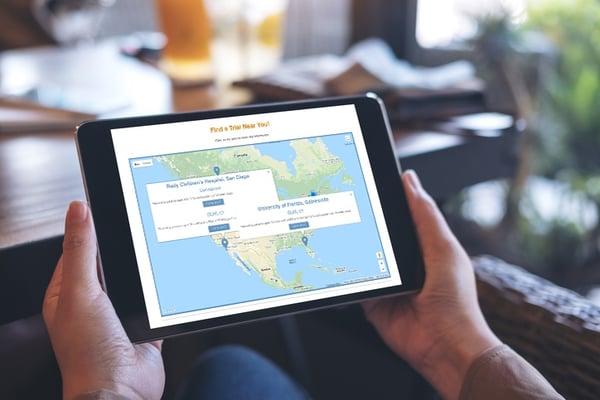FPWR maintains the latest clinical trial information so that you can stay abreast of trial opportunities. Some trials require in-person visits, while others can be completed remotely. Some trials are testing new drugs, while others are intervention (non-drug) or natural history studies. Details of recruiting studies can be found below.
Drug Trials Recruiting Now
LIGHT THERAPY (AGES 6+) - AGE ELIGIBILITY EXPANDED
This study is evaluating the effectiveness of bright light therapy in reducing daytime sleepiness in PWS. The study is 100% remote and does not require any travel. All study visits will be conducted via teleconference and participants get to keep their fitbit and light device! Learn more >>
PITOLISANT FOR EXCESSIVE DAYTIME SLEEPINESS - NEW SITES AVAILABLE
This Phase 3 study, TEMPO, is now open and enrolling participants ages 6+ who struggle with excessive daytime sleepiness. Learn more >>
VNS4PWS FOR DISRUPTIVE BEHAVIOR (AGES 10-40) - NEW SITES AVAILABLE
Does your loved one struggle with disruptive behavior and temper outbursts? The VNS4PWS trial is enrolling people with PWS who have a history of temper outbursts over the past 6 months. Only 2 in-person visits are required. Learn more >>
CARBETOCIN FOR HYPERPHAGIA IN PWS (AGES 5 - 30) - NEW SITES AVAILABLE
This Phase 3 study of carbetocin nasal spray is enrolling participants ages 5 to 30 who struggle with Hyperphagia. Learn more >>
Online Study Participation Opportunities
Global PWS Registry
The Global PWS Registry is a powerful tool for the PWS community to advance areas of unmet need, standards of care, and new therapies. Data from the registry is shared back to the PWS community and is also used by researchers and scientists. Visit the registry at www.pwsregistry.org.
Early Indicators of Challenging Behaviors
Individuals with PWS often exhibit rigidity, obsessive-compulsive behaviors, temper tantrums, impulsiveness, and unusual thoughts and behaviors. We would like to gain a better understanding of the early risk factors of these behavioral challenges so families can seek earlier and more individualized interventions. If your loved one is 2 years or older, you can help by completing 6 questionnaires in the Global PWS Registry 3 times over the course of a year. Completing all 6 surveys should take about 30 to 45 minutes. Our goal is to use this information to provide guidance regarding the need for earlier intervention and management.
To get started, please visit www.pwsregistry.org. If you have not previously enrolled in the registry, you will need to join and complete the consent before accessing the surveys. Participants who complete/update all 6 surveys by March 31, 2025, will be entered to win 1 of 4 $100 Amazon gift cards!
MyHQ
The Prader-Willi Syndrome Research Team at Vanderbilt University is looking for people with PWS ages 10+ who can share how hunger affects their lives. The study is virtual and will take less than 20 minutes for parents and less than 20 minutes for their child with PWS in a ZOOM call with an interviewer. Get started >>
Clinical Trials Overview
A multitude of factors come into play when determining whether to participate in a clinical trial. To help make it easier to see which trials may be right for you and your family, we have generated an easy-to-read matrix that compares common variables such as age and BMI requirements, study sites, and estimated start dates. Click here to see the full PWS Clinical Trials matrix.
Find a Trial Near You
Use our interactive map of clinical trials!
Donation of Tissues Needed
Scientists need samples to study PWS – without your contributions, these studies can’t make progress!
Post-Mortem Brain Donation.
Organ donation is a highly personal decision that has the power to accelerate research and transform the lives of countless families affected by PWS. You can make a tremendous difference in research into Prader-Willi syndrome by participating in this program. In the event of a death, contact the 24-hour hotline number: 1-877-333-0999 for immediate assistance. Learn more >>
While we are pleased to share with you these opportunities for participating in PWS clinical trials, FPWR does not endorse or recommend any specific trial. Please contact the study coordinators directly for important details about each study and to answer any questions you may have. Some trials may have funds available to support travel to study sites.
Please contact the study coordinators directly for important details about each study and to answer any questions you may have. Some trials may have funds available to support travel to study sites.









